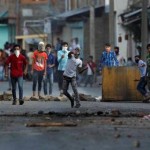Vilifying the Army seems to be the fashionable flavor these days. Accused of the murder of children – regardless of whether they wielded AK-47’s or stones, to the imposition of the Armed Forces Special Powers Act, it all appears to be the fault of the Army. Primetime TV debates are filled with strident cries for the need to prevent the use of overwhelming or ‘disproportionate’ force by the Army. Every politician wanting to be heard wants the withdrawal of the AFSPA. In these turbulent times, it’s time for a reality check, lest we lose the last bastion of sanity.
The Indian Army, like any other, is fundamentally trained and equipped for total war – absolute violence in an environment that calls for it. It is not a police force and should not be equated with one, in terms of either training or equipment.
In situations where civil administration is unable, or unwilling, to cope, the Government may call in the Army. For such a situation to arise, this means that it is no longer a simple law and order problem and therefore normal policing is not effective. Enter the Army.
Being an efficient force, it succeeds where the police have failed, thus bringing out cries of ‘disproportionate’ force by opponents on the other side. The cries from these opponents are the first to be heard since there are no media restrictions, and are quickly picked up by the media. This is repeated on TV, on social media and in newspapers so that we, the Nation, begin to believe the lie which is so often repeated. The Army meanwhile has been effectively gagged by its own bureaucracy, and remains silent.
This situation suits the other side perfectly; they want the government to withdraw an effective force so that they can continue to dominate the police and the region. We are inadvertently playing into anti-national hands here.
The objective of terrorism, as emphasized by Bruce Hoffman in his classic ‘Inside Terrorism’, is not just to kill but ‘to create power where there is none, through the publicity generated by their violence’. We and our media give the other side the power of publicity, without which terrorism is just dead bodies. Our distortion of the truth aids the cause of the militants.
Every book and discussion on internal security will tell you that the solution to a secessionist problem is primarily political, not military. The Army can only be used to create an environment where peaceful negotiations between parties can occur – the Army cannot solve the problem. We often, mistakenly, tend to view the induction of the Army as the final solution which it can never be. On the contrary, in many areas of civil unrest in our country, the turbulence is used as a platform for political parties to attack each other. This exacerbates the unrest, bringing to naught to the gains of the Army. Jammu and Kashmir is a perfect example of this, where major political parties never appear to attempt to solve the fundamental problems.
The Armed Forces Special Powers Act (AFSPA) is also a much misunderstood act, and has become vilified as a result. The original act was enabled to allow the use of the Army in an area of unrest so that secessionist forces would not prevail. Since then, various modifications like a partial withdrawal have been suggested; however the amendment of the AFSPA means a compromise on national security.
Operations against any secessionist force would be difficult to begin with; however, they become even more problematic when secessionist elements are supported with training and weapons from other countries. Therefore when our troops and officers are deployed into such operations at the behest of the government, they need to be provided the necessary protection so that they can function efficiently and fearlessly. Circumstances where the Army is accused of human rights violations are an exception, not the norm. No military commander will accept the willful violation of human rights.
No country has been able to fight anti-national or secessionist forces using the normal law of the land. An Army needs to be legally permitted, by means of AFSPA or another law, to operate within its own nation’s borders. Hence, the question is not whether to enact AFSPA, but rather it is whether the Army is required or not, because no Army means no AFSPA.
The Army serves as our first line of defence against external threats, and our last option for internal civil unrest, hence it becomes vital to ensure that we do not blunt our most crucial weapon of final recourse.
If we pander to the other side’s propaganda for ‘enquiries’ into military actions, we will quickly end up with a demoralised force, which is unwilling to take action for fear of retribution. We will erode the very reason why a militant fears the Army – the efficient, direct approach.
The next time a military commander feels that his position is about to be overwhelmed by a mob, crucial decisive action might be delayed under the onus of providing proof of intent. Either the troops will delay their actions or they will cease to deploy. Neither option is beneficial to the situation.
It is often said that God, insurance policies and the Army are only remembered in times of need. This is the Nation’s hour of need; let us ensure we remember the Army.
Xerxes Adrianwalla is a retired Brigadier of the Indian Army and a regular contributor to Gateway House: Indian Council on Global Relations.
This blog was written exclusively for Gateway House: Indian Council on Global Relations. You can read more exclusive features here.
For interview requests with the author, or for permission to republish, please contact outreach@gatewayhouse.in or 022 22023371.
© Copyright 2016 Gateway House: Indian Council on Global Relations. All rights reserved. Any unauthorised copying or reproduction is strictly prohibited.


